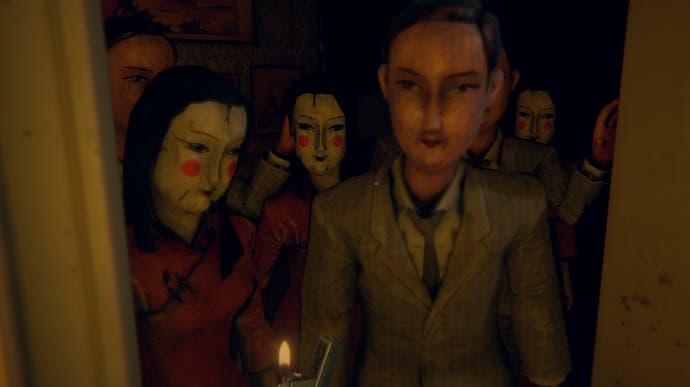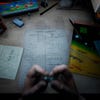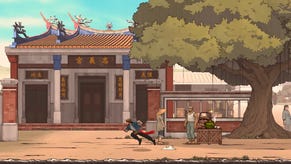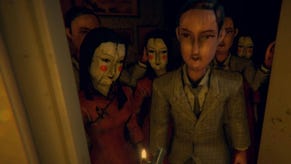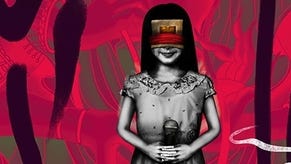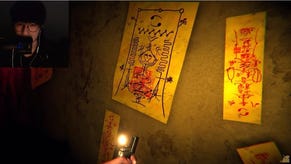The making of Devotion, China's least favourite horror game
"We want the public to know we will continue our work."
Red Candle's Devotion is one of the finest horror games of the past decade, and if you haven't played it already, it's possible you never will. Following its release this spring, the game was found to contain an unflattering reference to China's president, Xi Jinping. The discovery sparked an outcry among Chinese players, leading to the withdrawal of Chinese distributors, the closure of Red Candle's account on Weibo, one of China's largest social media platforms, and the removal of the game from Steam in China. Red Candle, which is based in Taiwan, has apologised at length for what it says was a placeholder asset, accidentally transferred to the final release. These comments were not enough to stem the backlash, however, and a week after sale, the developer pulled the game from Steam in all territories to perform unspecified fixes. Seven months on, it's unclear whether Devotion will ever see daylight again.
There is obviously a longer story to tell here about the Chinese state's sensitivity to criticism, the culture of Chinese patriotism online and the country's strained relationship with Taiwan, but when I approached Red Candle for an interview in February, it was simply to hear about the creation of a complex and powerful artwork. Set across three periods in the cramped domestic life of a mother, father and daughter in 1980s Taiwan, Devotion ties prejudices about mental illness to the pressure of gender expectations and the lure of the irrational in troubled times. Like its equally accomplished predecessor, Detention, it is both a wonderfully scary game and an intricate account of the socio-historical forces at work within a small group at people. There was much to discuss, and naturally, the conversation below contains extensive spoilers.
I've read that you didn't intend Devotion to be a 3D first-person game at first. What was the original plan, and why did you decide to make the change to 3D?
Red Candle Games: As a matter of fact, Devotion was planned as a 3D first-person game from the beginning. But over two years of development, the design changed drastically. Originally, it was intended to be a much smaller-scale 3D horror demo that lasted for about 15 minutes, without much gameplay or narrative. However, as we invested more time into the project, each of us had more thoughts about the game design and how the story should go. We felt that a 15-minute demo simply couldn't satisfy our creative needs. Thus, we decided to expand the demo into a full game.
How much are Devotion's story and characters based on the personal experiences of the development team? And how much inspiration does the game take from other works of horror?
Red Candle Games: The setting and background of Devotion came from the memories of our childhood, but we also drew inspiration from our society as a whole. 1980s Taiwan was a time of economic boom, the growing entertainment industry, and the rising of popular culture. During this period, the media often depicted the success stories of hard-working, talented, persevering people. But in reality, we saw people strangled by the stress and ideas like "as long as you work hard, you will succeed", and "why can't you be as successful as others?" They struggled because of these unrealistic expectations from their peers, family and society. As a result, many people decided to seek out supernatural powers for guidance when there were no real solutions to real-life problems. Devotion is a title that delves into such emotions and contradictions.
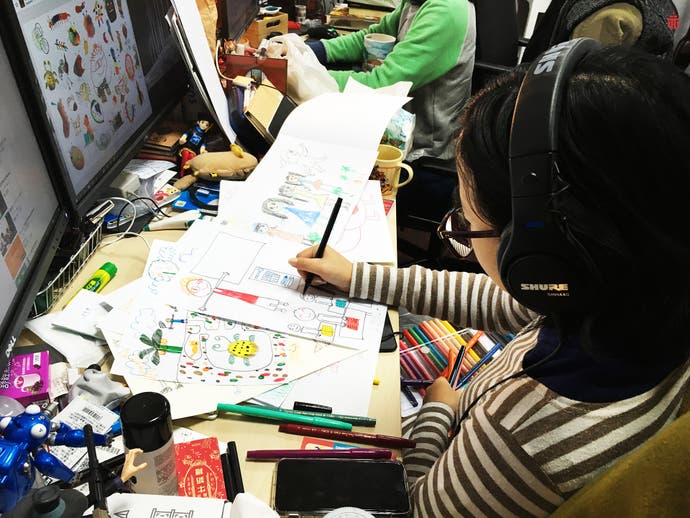
On the other hand, as this was our first attempt at a 3D game, we spent much of our pre-development phrase researching, including classical and modern horror films - for example we were greatly inspired by the visual composition and sound design of the film Hereditary - books about religion, and local news from the 1980s. More importantly we borrowed or learned a lot from games such as P.T., Layers of Fear, What Remains of Edith Finch and Outlast. While those games deeply influenced the creation of Devotion, the process was truly stressful for the team, because to build on top of game industry giants was not an easy task. We tried our best to be innovative, which led to countless hours redesigning our project. Thankfully, the support we received from our community throughout development helped boost our morale. Though the final result is nothing close to a perfect game, we are glad that the team stuck to the end and delivered something remarkable.
Can you take me through how you designed the layout of the apartment? Where did the idea come from for the apartment, and why did you arrange the rooms in this way?
Red Candle Games: The game's setting can be divided into two parts: the building hall and the apartment interior. For the building hall, we referred to Taipei's famous old neighborhood Nanjichang Apartment. This neighborhood was once one of the most modern and luxurious buildings in Taiwan, but it is now filled with dust and signs of age. For artists, the apartment complex has preserved the lifestyle of that period and that's why many Taiwanese films and TV series favour Nanjichang Apartment as a filming location. But for those who actually lived in the apartment, they might have different perspectives and experiences about the place. The contrast of Du Feng Yu's success in the early days and his failure later in a way resembles the building itself.
In terms of interior design of the apartment, we actually built it according to an existing layout. As some of our colleagues' relatives still live in houses like this, it was relatively straightforward for us to find references. Even though there was not much originality in terms of the layout, we spent a lot of time adjusting the details. For example, the apartment decoration and its furniture were supposed to reflect Taiwanese lifestyle in the 80s. But at the same time, we had to take playing experience into consideration - after all it's a game, not a simulation. For example, if a space was too narrow, players might feel discomfort in exploring, but if it was too broad, it wouldn't look like a Taiwanese apartment. In order to achieve that subtle balance, our artists put much effort into many unnoticeable details.
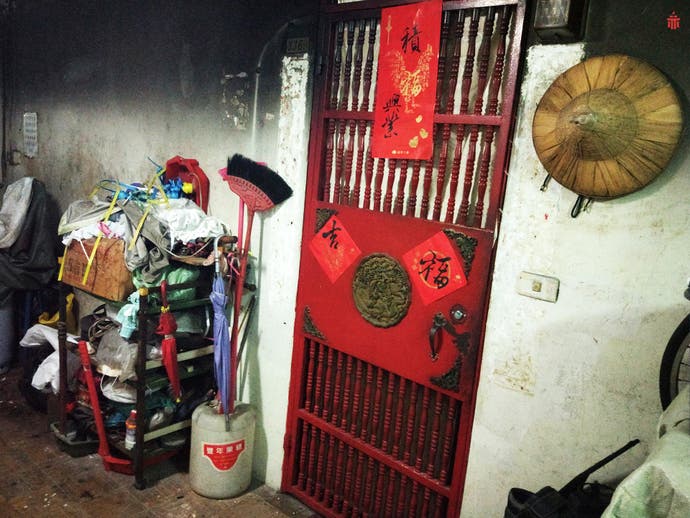
Devotion is a very detailed portrait of Taiwanese domestic life during the 1980s. How did you distinguish the three timeframes in the game using the apartment's furnishings and decorations?
Red Candle Games: In the game there are a total of four rooms and each represents an important time period which corresponds to a special memory of the Du family. Our team tried to make use of the apartment's decorations as symbols that help players differentiate the rooms. To achieve this we first listed all the key and memorable items one family could possibly own during different time periods, then separated them based on their functions and the timeframe. For instance, as time goes by a new model TV replaces an older one that was bought when the family first moved in. An expensive fish tank and the vinyl record player are bought when the father Du Feng Yu experiences his downfall in life. We utilised each furnishing and decoration to tell a complete story that hopefully helps players immerse themselves without excessive dialogue.
What were the inspirations for the god Cigu Guanyin and Mentor Heuh's teachings?
Red Candle Games: The religious elements in the game are all fictitious. In order to design these elements, we researched religious rites and folk customs from different countries. Our inspiration was not limited to Taiwanese Buddhism and Taoism; the aim was to make the fictitious rituals in the game easy to relate to for both the local and foreign audience. Additionally, we added many original elements to leave room for creativity in our team, and to avoid causing offence to any existing religions.
Our team had no intention to represent any specific religion or religious group. Everybody who worked on Devotion comes from different family backgrounds, values and beliefs. We feel most of the religions in the real world encourage people to be kind and bring them comfort. In fact, the religion in Devotion could simply be viewed [more generally] as a form of faith. If you look deeper into the story, you can see besides Cigu Guanyin, Du Feng Yu's devotion applies to many aspects of his life, including his rather [diseased] love for Mei Shin. That's the reason why Mentor Heuh could so easily get into his mind and manipulate his actions, leading him to make one mistake after another.
What was the inspiration for the game's TV talent shows, and how did you produce these? Did you make them yourselves, or hire a TV studio to help?
Red Candle Games: The children's talent-show Rainbow Stage in the game drew great inspiration from the famous Taiwanese TV show Five Lights Award, which was broadcast from 1965 to 1998. It was one of the longest-running television shows in Taiwan. For many Taiwanese of our generation, it's part of our childhood memories.
Our team wanted to recreate the ambience of this programme, but we knew very well that this was not something we could do by ourselves. We therefore approached Manson Chang, the director of Detention's documentary. Without his help, we wouldn't have completed the storyboard, scripts, characters, setting and filming of the show. Thanks to Manson, the cast and the filming crew, we were able to produce the TV show clips in the end and completed this challenging project. Side story: all Red Candle Game developers participated as background actors in the show. For a game developer, this was no doubt an interesting and valuable experience.
What research did you do for the portrayals of mental illness in Devotion, such as Mei Shin's panic attacks?
Red Candle Games: To properly portray the way people perceived mental illness in the 80s, we read old newspapers columns which made comment on the topic. Other than that, we asked our close friends and families who have personal experience battling depression, anxiety disorders, and other forms of mental illness. Also, in order to make sure that we didn't insert any misleading information, we consulted a friend who is a licensed psychiatrist.
We discovered that in the early days of Taiwan many who suffered from mental illness were discriminated against by our society. The general public was afraid of mental illness patients. They were tagged with bad names and made to feel uncomfortable and unacceptable in the community. But it's difficult to blame any individuals for this awful social phenomenon. It was more or less the fear of the unknown and the lack of knowledge about the illness that caused these prejudices. In Devotion, Mr. Du loved his daughter so dearly that he denied the truth: that his daughter was suffering from mental illness and becoming a "lunatic" as he describes her in the game.
So much of the horror in Devotion comes from parts of the apartment changing when the player looks away. Can you talk about how you scripted these scary moments? How did you make sure that players would notice all the apartment's changes?
Red Candle Games: During the development of Devotion, how to attract players' attention and guide their point of view has been a constant issue for us to solve. Though we were unable to find a perfect solution in the end, the following was our design flow.
First, we created a written script along with the storyboard for the whole team to discuss. However, as everyone imagined each motion in the game differently, we started to work on a motion storyboard by recording and editing actual footage. Before our artists worked on the real scenes, we would keep adjusting the motion storyboard until everyone was satisfied with its effect.
Besides visuals, sound effects are indispensable to direct the player's attention. After all, our eyeview is limited, only tracking what's happening in front of us, but sounds don't have such a limitation. Thus, with the effort of both the programmers and sound designers, players can hear and detect all of the subtle sounds from any direction in the apartment.
That's how we lead the players into our trap, to initiate the scary moments with the least expected timing. For example, at the very beginning of the game, we used the water flowing sound in the sink to lead players into the kitchen. Once they've finished examining and exit the area, they will notice that the water has stopped flowing, and might turn back to check. It's then you discover the female paper doll has switched position and is staring right at you.
Last but not the least, playtesting is very important. Toward the end of production, every week we'd invite different playtesters to come in and play our game in the office. By observing their reactions we made revisions accordingly, making sure each scene is properly staged and timed.
As a British person, I'd like to know more about some of the specific cultural references in Devotion. For instance, can you tell me about the symbolism of the Arowana fish - what inspired you to create a scene in which you see through its eyes?
Red Candle Games: According to Chinese/Taiwanese geomancy, or "Feng Shui" as we call it in our language, the arowana fish is said to be a sign of good fortune and luck. Because of this belief, once the fish tank was introduced to the Taiwanese market, the arowana fish was in high demand. The price of the fish sky-rocketed, making it a representation of wealth and a luxury pet owned by upper-class families.
In our story, Du Feng Yu purchases the arowana fish to symbolise his desire for success and his wish to improve the "bad luck" he has experienced. This superstitious and irrational deed is a signal that Mr Du's race for success has started to get out of control. Ironically, this pet fish later became Mei Shin's imaginary friend, which she talks to when she's feeling depressed. By looking through the eyes of the fish, we want to create a contrast between Dad's pipe dream - buying a fish could save his career and bring luck to the family - and the harsh reality.
I'd also like to know more about the funeral dolls and Mei Shin's origami tulips - what is the symbolism and history of these objects?
Red Candle Games: In Taiwan, a local custom is to burn various paper items as offerings to the dead. Through this process, many believe the dead can receive these items as real and usable objects in the afterlife. Even though in the real world, the paper doll, paper car, paper house may all appear to be useless decorations, for the dead these items are valuable possessions.
Over the course of the game, it is slowly revealed that Mr Du's mental state is highly unstable. With everything that's happening around him and the Mentor's otherworldly rituals, the fine line between fantasy and reality has become blurred for him. So we place the funeral paper dolls in the room, reflecting what's in his mind.
We used Mei Shin's origami tulips as a symbol for Mr Du's love towards his daughter. While Mr Du thought that to cure his daughter, he must seek the mentor's aid, it's implied in the story that instead of the "rituals", the act of folding origami tulips was the one thing that truly helped Mei Shin combat her illness and ease the symptoms of anxiety disorders. We also specifically use yellow tulip in the game because of its embedded meaning, a hopeless love. We thought it fitted perfectly with the story's overall tone.
I would love to hear about the creation of the 2D storybook sequence. It feels like the moment in the game when Mei Shin and Feng Yu have most kindness and respect for each other - he allows her to make positive changes to the story he is telling. Where did the idea for this sequence come from, and how difficult was it to implement a 2D platformer inside a 3D game?
Red Candle Games: The 2D storybook sequence was added after several months in development. Originally we simply wanted a scene to express Feng Yu's love for Mei Shin. Because most of the scenes in the game were designed for horror, we thought it'd be interesting to implement something different in the storybook section. This sequence serves as both a pattern-break for the narrative and a recovering point for the player's heightened emotions. As we were starting to plan the content for the storybook, we figured this would also be a great place to explain Feng Yu's relationship with Mei Shin. All in all, the storybook creates a warm moment and shows a different aspect of their daily lives, in contrast to the overall oppressive atmosphere.
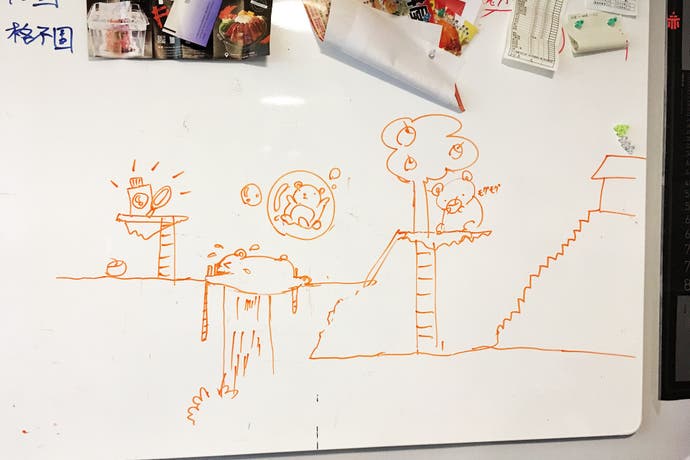
As regards the technical execution, our previous title Detention was a 2D sidescroller. While we had to design new gameplay along with the artstyle, it wasn't a step into unknown territory. We had a rough idea to recreate the hand-drawn illustrations of Taiwanese children's books from the early days, so we dug up a lot of references from local bookstores. The gameplay and voice-over were a bit tricky to implement - many revisions were made to make it feel right. Since we just wanted to polish every detail of the storybook, which is a relatively small part of our game, our team had one artist spend over three months working on it. When we received positive feedback regarding this embedded 2D game, we all felt rewarded for putting in so much effort.
How does the choice and composition of the game's music support the story?
Red Candle Games: The main goal in terms of sound in Devotion was to be as realistic as it can be, so there are not many traces of background music in the house. We used different household objects and tried to make them scary. A few examples would be the neighbour's jumping ropes, the creaking of the wooden chair, the marble ball Mei Shin plays with and the religious chants.
However there are three actual songs that the player hears in-game. One being Lady of the Pier, Li Fang's most famous song when she was a singer. It's also sung by Mei Shin during her competition. We wanted this song to be heard throughout the story and become a motif. It's a song about a lady, waiting for many years for her loved one to return from the ocean. This resonates with the meaning of the yellow tulips - a hopeless love. In the Du family, all three members show affection for one another in their own unique way. But in the end, their blind "devotion" turns into a form of hopeless love. The goal of the song's lyrics is to reflect this cruel reality.
The second song is called the 10 Masters of Diyu - Diyu is the concept of hell or the realm of the death in Taiwanese/Chinese mythology. It's a song sung by one of the renowned "Sing Talk" style singers, Mr Lu Liu Xian. The song was recorded in the 1970s. Players can hear the song in two locations: the hallway and during Mr Du's journey to rescue his daughter. As the title suggests, this song describes the environments of Diyu and its masters. When we stumbled on the song during our random research for old music, it immediately caught our attention with its unique sound and lyrics. We thought it'd add depth to our sounds.
Lastly, there's the game's theme song, Devotion, played during the ending animation. We collaborated with a Taiwanese indie band, No Party For Cao Dong, on this piece. Everyone in our studio is a big fan of their work, so when we wanted a song to represent Devotion their name popped up. We invited the band to our office to talk about the project and the possibility of working together on this final scene. They jumped on board with no hesitation after a simple briefing, which we are grateful for even today. The song acts as a third person's point of view toward the whole story. Through No Party For Cao Dong's beautiful lyrics and melody, players may go over the story one last time and collect their thoughts.
I'm interested in the portrayal of Gong Li Fang. She is a very sympathetic character - a successful woman who gave up her career to support her husband's dreams, and who struggles with her conscience about leaving him. Did you ever think about letting us see more of the story from her perspective?
Red Candle Games: The mother Gong Li Fang was once a superstar singer. She got married to the scriptwriter Du Feng Yu, whom she met during her first movie-acting role. When the family encountered some financial issues, and given that Feng Yu wasn't doing much to support them, she decided to resume her career with the goal that once she earned enough money, she would return to take her husband and daughter away and restart their family life somewhere else. Feng Yu felt that his role as the man of the house and bread winner was challenged by his wife. Thus, in his mind he somehow "ghostified" the image of Li Fang. That's why for the most of the game, Li Fang is seen as a female ghost, but in reality, she simply left temporarily to earn money. So in a way, Li Fang is more like a modern woman whereas Feng Yu represents a man of his time with traditional values.
Originally we had planned to showcase more of Li Fang in the story and give this character more depth. However after a few playtests, we decided to limit the narrative of Li Fang based on the fear that the player might lose focus during their playthrough (our game is relatively short and most of the storylines are told indirectly). But it's definitely one of the few regrets we have on completing the game. Li Fang could be illustrated more thoroughly, rather than as a mere sympathetic mother figure.
Can you take me through the conception and design of the other world Feng Yu travels through during the false ritual to cleanse Mei Shin at the end of the game? How did you adapt ideas about spirit realms from religion and mythology?
Red Candle Games: In Taiwanese/Chinese mythology, Diyu, or the realm of the dead, is a place where sinners face judgement and receive punishment, similar to Hell in western culture. Diyu was the main reference for us when designing Feng Yu's journey to the other world. But then of course we couldn't just copy all the elements and paste them into our game. We know that crafting our own version of Diyu was necessary for the story to co-exist with this idea. Therefore, in many cases we borrowed settings from the traditional Diyu and tweaked them to serve our needs. For example, we learned that there's a layer of Diyu consisting of raining needles and thorns. We changed the needles to writing pens to symbolise Feng Yu's script-writing career.
When coming up with the settings, we took things from different sources - Taiwanese/Chinese mythologies, Taoism, Buddhism, local customs and lores. Part of the reasoning was that Taiwanese/Chinese belief systems are very complex, often consisting of a combination of the various ideas mentioned above. Therefore, while we grabbed the concept of Diyu from Buddhism and [general mythology], the idea of Yuan Shen or the spirit realm is part of Taoism's teachings. Ultimately, we relied on our cultural background and used what we had around us, inserting elements that we deemed would fit our main storyline. What surprised us most was that by the end of development we had created something new.
How do you think players should feel about Feng Yu at the end? Is there room for any sympathy at all?
Red Candle Games: We tend to give the players the option to draw their own conclusions, so in every story that we tell, more often than not, there are no pure evil characters. We believe that you'll rarely see someone do harm without a reason. Feng Yu falls into that category. He loved his family dearly, though the ways he showed his love may not have been for the best. He decided that he was the man of the house, thus it was his responsibility to care for the family's wellbeing. His old-fashioned mindset and stubbornness led to disastrous results.
We think it's a matter of perspective. Put yourself into the character's shoes, and based on their background, would you do the same? This is the question we want to throw to our players.
Is there anything else about the game you'd like to discuss - something you're especially proud of?
Red Candle Games: Looking back at what we've done, we think the most impressive thing was to finish a project that was originally beyond our capabilities. Considering that we're a small studio of 12 developers, moving from our previous 2D title Detention to the 3D first-person Devotion was a rather difficult task for us. From programming, 3D graphics, 3D sound, voice-over, to producing real-life footage, we had to learn many things from scratch with countless challenges and setbacks. On top of this, there was the [pressure of] high development costs and the unpredictable market response over two years in development. Basically, we all felt it was a high-stakes gamble. We truly appreciate all personnel and partners who supported and worked alongside us during development.
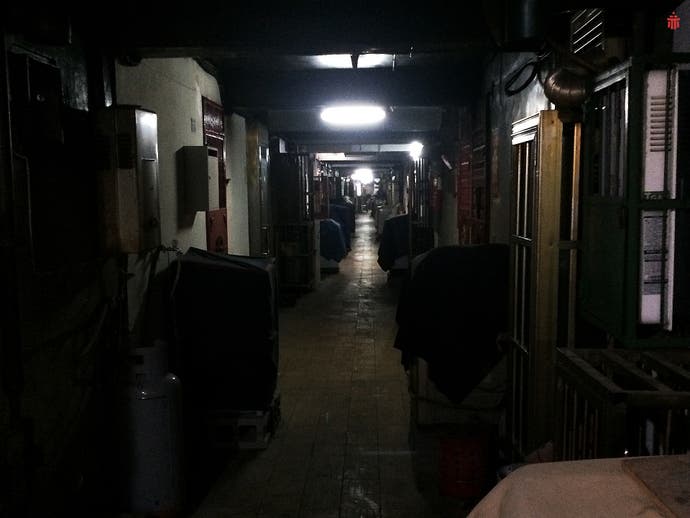
During the first week of its sale, the happiest thing for our team was to be able to share with our audience, families and friends the thing we had been working so hard on, and to showcase our creation to the world. More importantly, it was about having a chance to thank our partners who believed in our ability to make Devotion a reality.
We are sad to see Devotion, which includes all of our partners' and Red Candle Games' efforts, gone in vain following the incident. Due to our careless and unprofessional act, our audience is unable to experience the game, and for this, we feel truly sorry.
What needs to happen for Devotion to be released again?
Red Candle Games: We don't have an exact date nor timeline for its re-release. As we stated in our Facebook post on 15th July, we want to send a message from our official channel and apologise to everyone involved. But of course we fully understand that one post on Facebook may not clear away people's doubts and worries, so as a company, we want the public to know that we will continue our work. And hopefully in the future we will earn more trust from our audience.
What does the future hold for Red Candle Games after Devotion? Will you continue to make horror games that investigate moments in Taiwanese history?
Red Candle Games: As both developers and gamers, we love to explore different genres and topics. We think as a small company, we have the flexibility to experiment with all sorts of things, however crazy! Although Taiwanese elements were our main inspirations for our first two games, this only happened because the story and gameplay fit together naturally. It all depends on where our creativity takes us. We also feel blessed that both of our previous titles have received some degree of recognition. One thing we're certain about is that as long as there are still people who appreciate our work, Red Candle Games will keep on making games.
